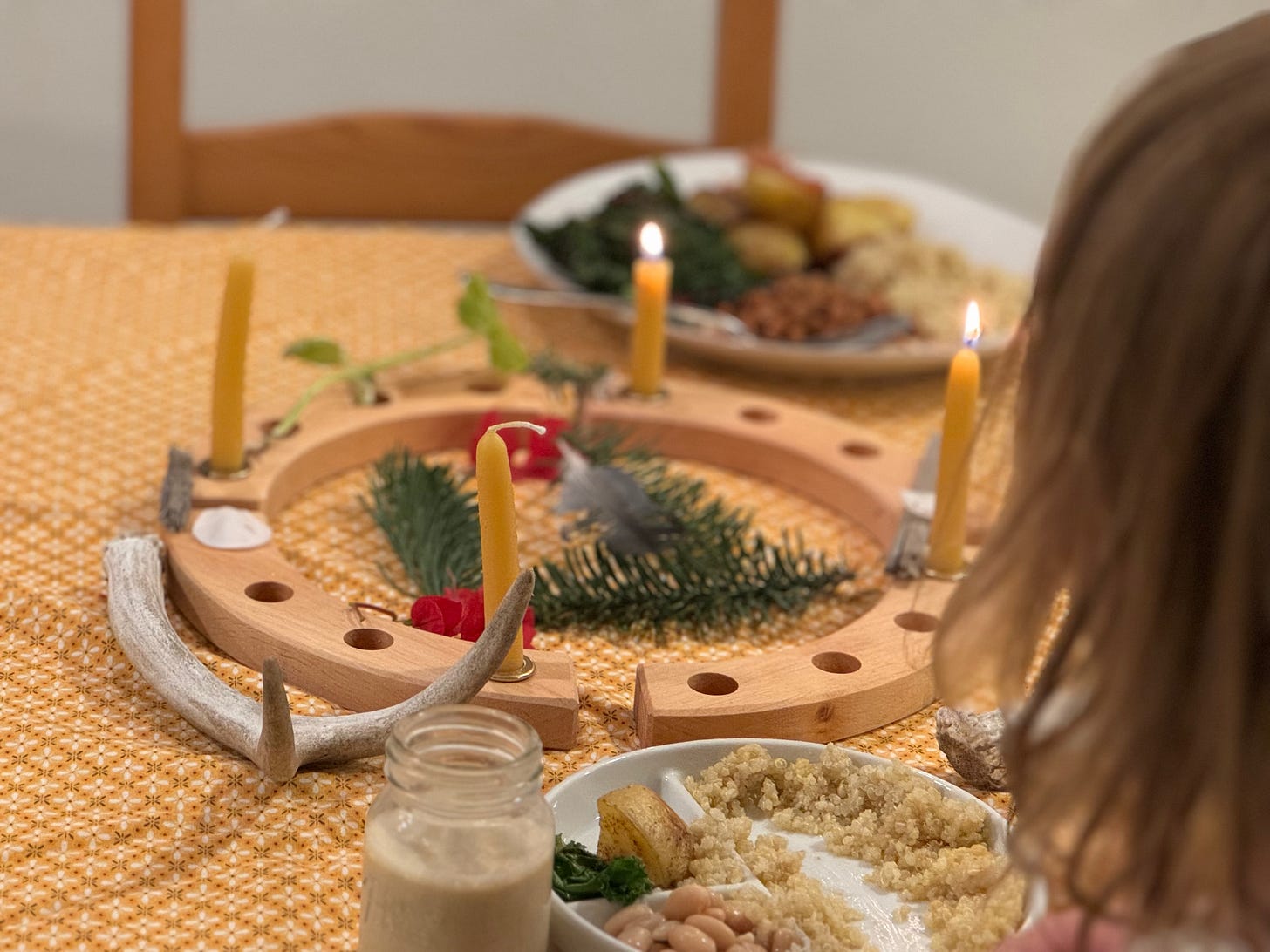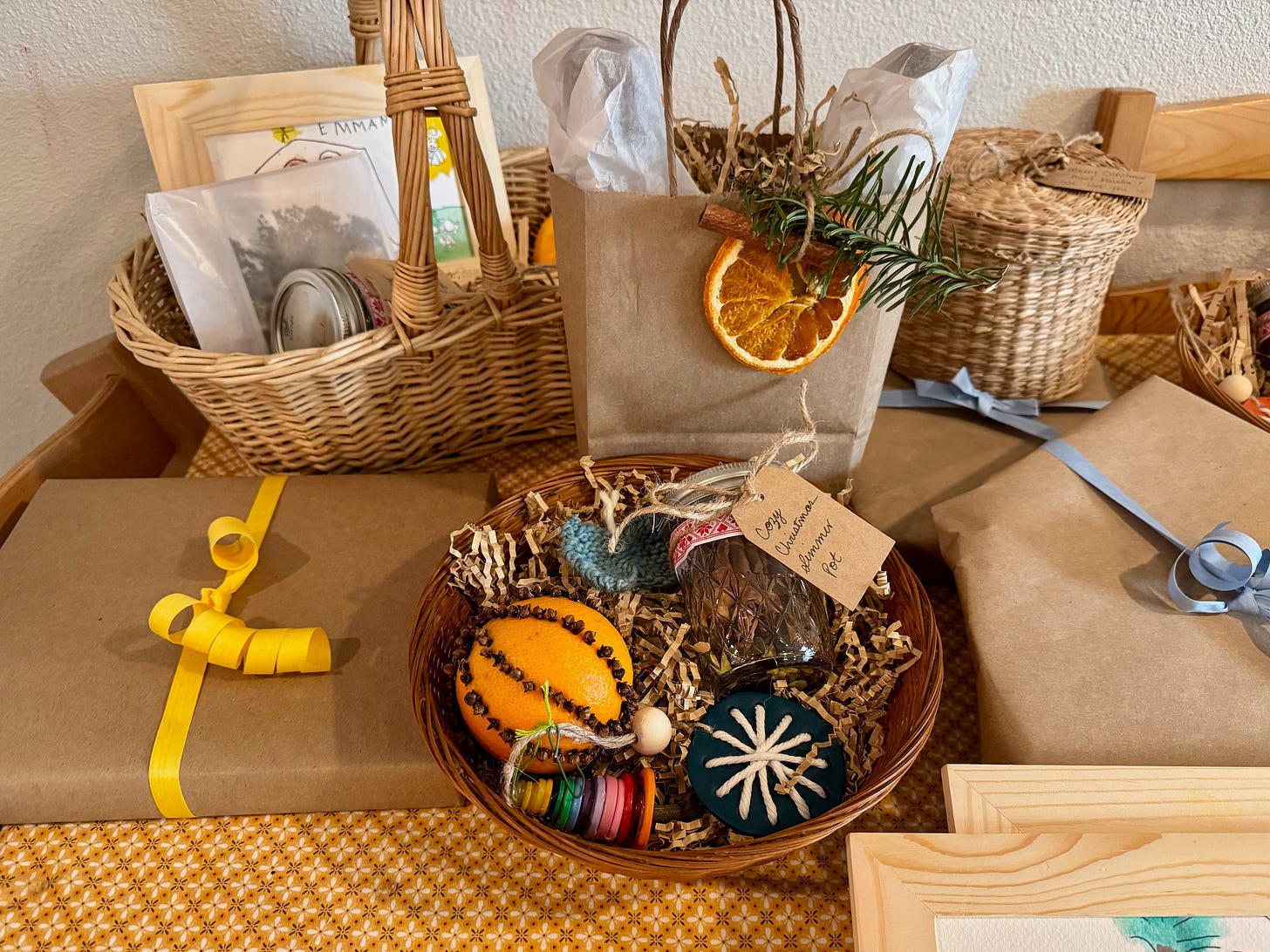I began writing down my thoughts on Advent several weeks ago, but in honor of my intention to slow down and simplify this season, I ended up putting it aside to be present with my family. This week, I have been reflecting on Christmas and making notes for next year and while doing so, I decided to revisit this piece and publish it retrospectively.

Somewhere along the way as an adult and as a mother, I lost the magic of Christmas. I began to approach the season with anxiety and dread. I felt an inordinate expectation to make everyone around me happy and feel loved as if this was up to me and me alone. And while loving my family and friends and making them happy is something I will always strive to do, I was wrong on at least two counts. The first is that it is not on me solely to make other people happy and in fact, it connotes a false pride of self-importance. Second, my sense of being accepted and loved was wrapped up in their response to me, rather than in my inherent identity as beloved, a child of God. I put pressure on myself to show up as beautiful, charming, gracious and at ease, pressure to never show strain or sadness, pressure to buy the right gifts of the right value to show my loved ones how much I care about them, and pressure to create a magical experience for my children. Ironically, the “better” I performed, the more pressure I felt. It all felt misguided and led to the feeling of dread because as Nouwen writes, it is impossible to respond adequately to all the conditions of the world. We are destined to fall short.
At issue is the question: ‘To whom do I belong? To God or to the world? … As long as I keep running about asking, ‘Do you love me? Do you really love me?’ I give all power to the voices of the world and put myself in bondage because the world is filled with ‘ifs.’ The words say: ‘Yes, I love you if you are good-looking, intelligent, and wealthy. I love you if you have a good education, a good job and good connections. I love you if you produce much, sell much, and buy much.’ There are endless “ifs” hidden in the world’s love. These “ifs” enslave me, since it is impossible to respond adequately to all of them. The world’s love is and always will be conditional.” Henri J. M. Nouwen, The Return of the Prodigal Son: The Story of Homecoming
This year, however, felt different than years prior. I felt a subconscious shift within. In the weeks leading up to December as I began to mentally review and prepare for the holidays, my attention continued to snag on Advent. I began to see Christmas as part of an arc: a celebratory culmination of a season of preparation and intentionality. Instead of approaching the month of December in a flurry of preparation, I began to see it as a season of contemplation and intentionality in preparation for the joy of Jesus’ birth.
“Advent, meaning “the coming,” is a time when we wait expectantly… Like Mary, we celebrate the coming of the Christ child, what God has already done. But waiting is not a passive waiting. It is an active waiting. As any expectant mother knows, this waiting also involves preparation… care, prayer, work; and birth involves pain, blood, tears, joy, release, community. It is called labor for a reason. Likewise, we are in a world pregnant with hope, and we live in the expectation of the coming of God’s kingdom on earth. As we wait, we also work, cry, pray, ache; we are the midwives of another world.” Common Prayer: A Liturgy for Ordinary Radicals (Clairborne, et al. 2010, p.48)
I know this is old news for many, but it felt like a revelation for me. I wanted to do things differently this year so I came up with a threefold plan. First, I would reduce my consumption of technology. Second, I committed to reading two devotionals each day. And third, I committed my heart to choosing peace over perfection in our family and home.
While I wanted to fill my heart with truth and beauty and goodness, first I knew I needed to clear space in my heart and mind. I scaled back my use of technology to make room for what is truly important. I deleted all apps that scrolled (news, email, substack, instagram, youtube, and even tricky ones like amazon and Etsy). I challenged myself to keep no tabs open in my phone or computer browser. I unsubscribed from as much as I could and quieted notifications on my phone excect my ringer. I did my best to make my smartphone a “dumbphone.” Honestly, I do not know why it took me so long!
In Digital Minimalism by Cal Newport, he emphasizes the importance of not just subtracting technology, but adding other things of value. In place of using my phone, I read, did Christmas crafts with the kids, and was more present in my life and with my family. I also added the two advent devotionals. I tried to read a passage from each book every morning, but often played catch up every couple of days while the boys were playing outside. Whether daily in the morning or every couple of days in the afternoon at the park, these readings filled me up and gave me good things to think about throughout the day. The first devotional I read was Advent and Christmas Wisdom which draws from the work of Henri J. M. Nouwen, a priest and theologian known for his psychology, pastoral ministry, spirituality, social justice, and community interests. The second devotional I read was the Book of Common Prayer: A Liturgy for Ordinary Radicals, which has been refreshingly… radical! It boldly speaks of justice, peace and redemption in a beautifully countercultural way.

My last resolution to choose peace over perfection was harder because it is a more loosely defined goal. Our house admittedly does not always feel so peaceful, but I recommitted each day to leading our family towards peace. I am continually convicted in my role as a leader day in and day out. When I let my anxieties or distractions get the better of me, those feelings seep into our home life and manifest in the boys’ behavior. The hardest part of choosing peace over perfection for me was the struggle to accept imperfections and opt out of a pattern of self-flagellation (word choice). Being imperfect is not new, but choosing to let go of the self-criticism is.

While these three intentions were not perfectly executed, they ultimately brought about some expected and unexpected changes in my heart. These practices opened up room for reflection and contemplation. In the ensuing quiet, uncomfortable feelings surfaced. The constant “noise” of my devices and the busyness of our days had suppressed some feelings of sadness, insecurity and uncertainty that needed to rise. Joy intertwines with sorrow. We cannot have one when we numb the other. Therefore, an unexpected blessing of this past Advent season was an opportunity to befriend these feelings. When I allowed myself to experience sadness and fears, the good news of Jesus’ coming becomes really, really good news: God moving into the neighborhood, Love embodied, Light in darkness, God incarnate, divinity within and between all living and nonliving things.
Everything in our society teaches us to move away from suffering, to move out of neighborhoods where there is high crime, to move away from people who don’t look like us. But the gospel calls us to something altogether different. We are to laugh at fear, to lean into suffering, to open ourselves to the stranger. Advent is the season when we remember how Jesus put on flesh and moved into the neighborhood. God getting born in a barn reminds us that God shows up in the most forsaken corners of the earth… With his coming we learn that the most dangerous place for Christians to be be is in comfort and safety, detached from the suffering of others.” Common Prayer: A Liturgy for Ordinary Radicals (Clairborne, et al. 2010, p.48)
What that means to me living a life of comfort, safety, and privilege, I continue to ponder. However, viewing Advent as a season of preparation for something this beautiful, has helped me to find what is truly joyful about Christmas. I am more aware than ever of my need for God’s transcendent Love in my life. Only when we truly feel our humanity can we encounter the divine.





I always love reading your words, and I was so surprised when you mentioned A Liturgy for Ordinary Radicals. I loved that book years ago when my kids were young. It's been over a decade since I have thought about it! What a happy memory!
Wow...So well written and thoughtful. Loved it.